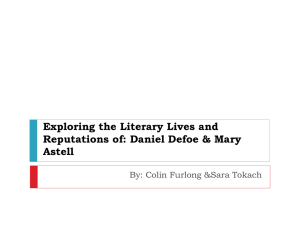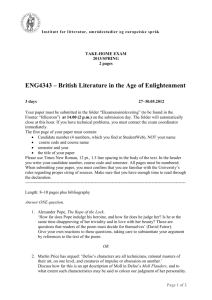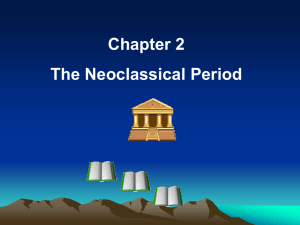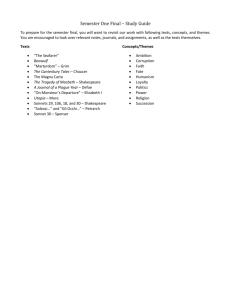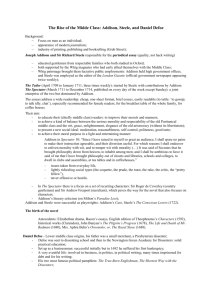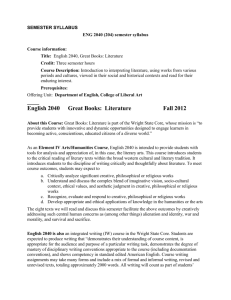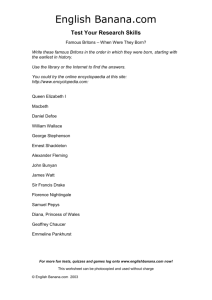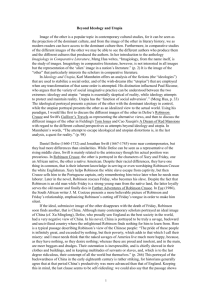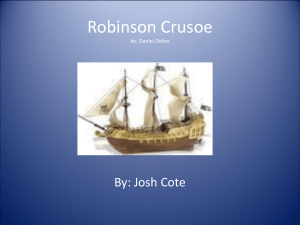Introduction to Daniel Defoe: A Selected Critical Anthology, 1700
advertisement
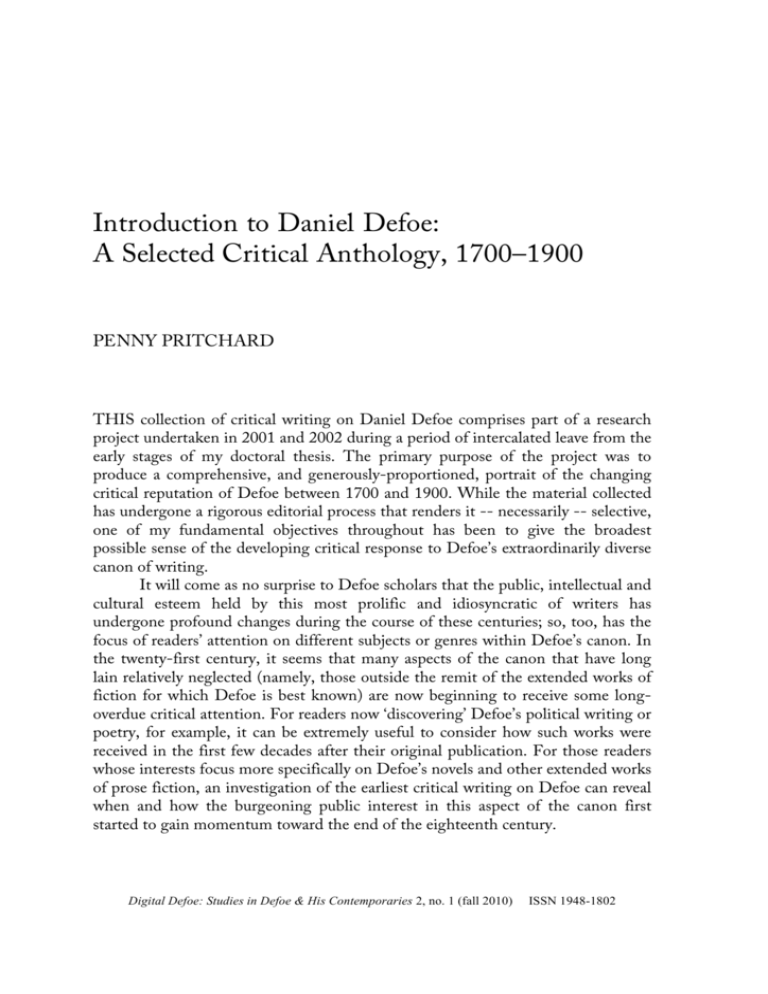
Introduction to Daniel Defoe: A Selected Critical Anthology, 1700–1900 PENNY PRITCHARD THIS collection of critical writing on Daniel Defoe comprises part of a research project undertaken in 2001 and 2002 during a period of intercalated leave from the early stages of my doctoral thesis. The primary purpose of the project was to produce a comprehensive, and generously-proportioned, portrait of the changing critical reputation of Defoe between 1700 and 1900. While the material collected has undergone a rigorous editorial process that renders it -- necessarily -- selective, one of my fundamental objectives throughout has been to give the broadest possible sense of the developing critical response to Defoe’s extraordinarily diverse canon of writing. It will come as no surprise to Defoe scholars that the public, intellectual and cultural esteem held by this most prolific and idiosyncratic of writers has undergone profound changes during the course of these centuries; so, too, has the focus of readers’ attention on different subjects or genres within Defoe’s canon. In the twenty-first century, it seems that many aspects of the canon that have long lain relatively neglected (namely, those outside the remit of the extended works of fiction for which Defoe is best known) are now beginning to receive some longoverdue critical attention. For readers now ‘discovering’ Defoe’s political writing or poetry, for example, it can be extremely useful to consider how such works were received in the first few decades after their original publication. For those readers whose interests focus more specifically on Defoe’s novels and other extended works of prose fiction, an investigation of the earliest critical writing on Defoe can reveal when and how the burgeoning public interest in this aspect of the canon first started to gain momentum toward the end of the eighteenth century. Digital Defoe: Studies in Defoe & His Contemporaries 2, no. 1 (fall 2010) ISSN 1948-1802 This research was originally conceived as a publication project to comprise an anthology in the form of two lengthy hardcover volumes. Unfortunately, the prospective publisher for this research material ceased trading before the project came to fruition. In turn, the material remained relatively undisturbed on my computer for a number of years and, over time, the facilities of electronic resources such as Early English Books Online and Eighteenth-Century Collections Online arguably superseded the immediate ‘usefulness’ and accessibility of at least its eighteenth-century portion. Having said this, for readers unsure of what it is, precisely, that they seek to find concerning Defoe’s critical reputation, there is some merit in starting with a pre-collected selection of texts to peruse at their leisure. On a personal note, the process of collecting together these extracts did a great deal to enrich my own understanding of how Defoe’s writing was received by the wider English reading public between 1700 and 1900 and so has been an invaluable research exercise for me. Suffice to say, the research undertaken to produce this selection of critical writing will have been an even more worthwhile exercise if it offers twenty-first-century Defoe enthusiasts even a single new insight into their own study of this marvellously complex and rewarding author. Like most Defoe scholars, I feel that the invaluable contribution of electronic archives is an enormous boon to research and cannot be underestimated. At the same time, however, any study of the body of critical writing that considers Defoe’s canon in its entirety will always be -- like the canon itself -- a work in progress. In the case of Defoe, perhaps more than any other eighteenth-century author, ongoing scholarly debates concerning both the issue of attribution and the precise details of Defoe’s biography ensure that this situation is likely to remain in place. The following resource is, then, offered as a supplementary (and hopefully enjoyable) archive of selected early critical material on Defoe; it is in no way intended to offer a ‘definitive’ portrait of Defoe’s early reputation, and some of the editorial processes that informed this selection are discussed further on in this introduction. The nineteenth-century critical writing included here comprises perhaps only half of what should be offered in a truly comprehensive investigation of Defoe’s critical reputation between 1800 and 1900. Taken in its entirety, my experience of reading nineteenth-century critical writing on Defoe -- the period that largely established the author’s reputation as a novelist, arguably to the exclusion of his wider genre -- found that this writing demanded a wholly different editorial process to the one employed for eighteenth-century writing. Certain aspects of Defoe’s critical reputation evident in the previous century continued to be explored in the nineteenth (for example, diverse speculation concerning details of Defoe’s biography, or debates about his seemingly ambivalent political loyalties). At the same time, the nineteenth century witnesses a rapidly growing number of writers whose primary concern is the moral and educational remit of the novelist. These are subjects that first become apparent in the latter decades of the eighteenth century when critical investigation of the novel and its heritage in older literary forms (such as the romance) are explored through works such as Hugh Blair’s Lectures (1783) and Clara Reeve’s The Progress of Romance (1785), as well as, of course, Rousseau’s Emile (1762), but it is in the nineteenth century that Defoe’s role as the author of Robinson Crusoe and other extended works of fiction begins, in earnest, to assume its (inevitable) primary position in such discussions. Of particular interest for those readers who seek to explore further the genesis of Defoe’s reputation as the author of ‘moral’ works of fiction are the spurious prefatory sections (purportedly written by Daniel Defoe) included with Francis Noble’s editions of Roxana (in 1775) and Moll Flanders (1776) as well as the brief review of the former work included in the March 1775 issue of the Monthly Review. As someone whose primary research falls outside of this area of investigation, I did not feel that I could do justice to Defoe’s developing critical reputation as a novelist during the nineteenth century. Indeed, I would be only too grateful for the insight of others to supplement and refine the nineteenth-century portion of this critical selection and, in doing so, perhaps to help enlighten Defoe scholars everywhere as to how the comparative neglect of this author’s remarkably diverse canon of writing outside of the novels continued for such a long time (arguably, well into the late twentieth century). EXTANT CRITICAL BIBLIOGRAPHIES ON DEFOE: AN OVERVIEW The original reference source that inspired this collection may be found in the Herculean cataloguing efforts undertaken by Spiro Peterson in his Daniel Defoe: A Reference Guide 1731–1924, supplemented by my personal inclusion of critical writing on Defoe from 1700–1731. Peterson’s work provides a comprehensive listing, purportedly of all writings about Defoe and his works, listed first by year of publication and then alphabetically by author (although this does not include works such as published doctoral theses). Each listing features a brief annotation summarising the content of the work and Peterson also offers his readers useful indices for Authors and Titles, as well as Subjects. Peterson’s comprehensive annotated bibliography also includes critical writing on Defoe in languages other than English; it has not been possible to include these works in this selection but Peterson notes a number of French works from the latter eighteenth century that would be worth including in a discussion of Defoe’s critical reputation as a novelist. In addition, Johann Gottfried Schnabel’s 1731 Foreword to Wunderliche Fata einiger See-Fahrer, absonderlich Alberti Julii (commonly known as Die Insel Felsenburg), the work that first coined the phrase and concept of the ‘Robinsonade,’ would be a valuable foreign-language inclusion to this critical selection. Peterson’s catalogue lists just over 150 titles from the eighteenth century; this includes works of which no copies have ever been traced, Robinsonades and criticism of them, and any other published work that makes even the most cursory reference either to Defoe or his attributed works. I have excluded a great many of the works that Peterson lists on the basis of a strict editorial policy that prioritises the ‘usefulness’ of the selection on offer here. Extremely brief extracts and duplicated material, for example, and virtually all of the Robinsonades and their criticism have been excluded (these latter works are not, strictly, ‘about’ Defoe or his writings but rather are works ‘inspired’ by Robinson Crusoe). There are some notable exceptions to this policy, for example in Thomas Spence’s A Supplement to the History of Robinson Crusoe, Being the History of Crusonia ... (1782), a fascinating early economic treatise espousing communalism that exploits what was clearly already the highly familiar setting of Robinson Crusoe in order to promulgate Spence’s (and most certainly not Defoe’s) views. A large portion of Peterson’s eighteenth-century list relates to Alexander Selkirk’s experiences on Juan Fernandez Island; I have refrained from including an excessive amount of this material due to its repetitiveness and its indirect relevance to Defoe. Some Selkirk-related material is provided, however, in order to indicate some of the early literary sources of Robinson Crusoe as well as its divergences from the Selkirk narrative. Some of the exchanges from the Gentleman’s Magazine during the 1780s reflect the ongoing debates concerning charges of plagiarism levelled against Defoe’s authorship of Robinson Crusoe, as well as the sustained interest during this time -- already highly apparent as early as the time of his death in 1731 -- in the finer details of Defoe’s biography. On the subject of biography, Peterson refers to George Chalmers’s Life of Daniel Defoe (appended as a preface to an edition of The History of the Union published in 1786) as “the first formal biography of Defoe which utilizes sound techniques of research.” The remit of this research project does not incorporate judgement on the criteria or soundness of Chalmers’s (or any other Defoe biographer’s) research techniques, but as Chalmers’s work constitutes the earliest published version of a substantial and comprehensive Defoe biography, it is included here in its virtual entirety, along with selected contemporary reviews of Chalmers’s work. There are also a number of earlier, shorter, pieces included in this selection that discuss or speculate on the known details of Defoe’s life, for example in the single lengthy excerpt from the fourth volume of The Lives of the Poets of Great Britain and England (1753) and numerous short extracts from John Oldmixon’s The History of England (1735). Such examples serve not only to emphasise the extent to which the “narrative” of Defoe’s life has remained inextricably intertwined with his critical reputation, but the fact that this was also the case during Defoe’s lifetime; early pieces with notable biographical content in this selection include A Hue and Cry After Daniel Foe... (1711) and Judas Discuver’d, and Catch’d at Last... (1713). Another invaluable resource that merits consideration in the compilation of this collection is Pat Rogers’s Daniel Defoe: The Critical Heritage. Rogers’s selection includes a great many of the most notable writers on Defoe before 1900 and, in his superb Introduction, he makes the very important point that much of the earliest writing on Defoe, particularly those works published during his lifetime, first established the author’s reputation as “a polemicist and party writer” rather than as an esteemed literary personage (1). It is certainly true that much of the writing on Defoe from this early period is of a personal or biographical rather than strictly ‘literary’ nature -- with arguable exceptions -- and to this end, most of Rogers’s critical extracts from prior to 1731 are very brief. Nevertheless, as Rogers rightly goes on to observe, “Defoe was a culture hero even when few of his books were read and fewer still admired” (3); in other words, the enduring fascination with Defoe’s wider critical reputation -- including his authorial or biographical reputation as it was first conceived during his lifetime -- considerably pre-dates his (later) critical recognition as a novelist and literary heavyweight. It is because of this that my selection provides a larger number, and more generous excerpts, from writings before 1731 than are included in The Critical Heritage. For Defoe scholars who seek to consider the further development of Defoe’s critical reputation, after 1900, a valuable starting-place would be John A. Stoler’s Daniel Defoe: An Annotated Bibliography of Modern Criticism, 1900–1980. REFERENCES TO DEFOE’S WRITING IN ‘WORKS OF LITERATURE’ Not directly included in either Rogers’s selection or my own, but usefully alluded to in The Critical Heritage, are the ‘glancing’ Defoe references that proliferate in other well-known literary works. In this context, Rogers offers the example of the extended passage in the seventh chapter of Oliver Goldsmith’s The Vicar of Wakefield (1766) that refers to Crusoe’s periagua. To such a list might also be added the Defoe-related references in the sixty-first chapter of Smollett’s Roderick Random (1748), the first and fifth chapters of Book VIII of Fielding’s Tom Jones (1749), Book Two of Emile (1762), Hester Piozzi’s Anecdotes of the Late Samuel Johnson (1786), James Boswell’s Life of Johnson and Benjamin Franklin’s Memoirs (both 1791), and many more. The relative frequency of such references in eighteenth-century texts, most of which allude to Defoe’s own works of extended fiction, underlines the burgeoning critical reputation of ‘Defoe the novelist’ from the second half of the eighteenth century. The inclusion of one particular literary text from the eighteenth century merits some clarification in this context. This is William Cowper’s Verses, Supposed to be written by Alexander Selkirk..., a text which is included in this critical selection despite my editorial reluctance to include too many works that might be described as Robinsonades. The distinction here, of course, is that Cowper attributes his literary inspiration not to Robinson Crusoe but directly to the Selkirk narrative itself. Important parallels might now be drawn between the uniquely contemplative and solitary entity whose divine faith is inspired by his natural surroundings in Cowper’s poem, and Defoe’s protagonist (a feature emphasised in the later frequent reprintings of Cowper’s poem under an altered title or the authorship of “Robinson Crusoe” himself) but Cowper’s original work remains an interesting parallel work of literature rather than a Robinsonade. ‘DEFOE THE NOVELIST’ VERSUS ‘OTHER DEFOES’ If it will come as no surprise that “Defoe the novelist” has remained the chief consideration of most writers on this author, particularly since the second half of the eighteenth century, there are many more pleasant surprises awaiting readers who seek ‘other’ Defoes in this selection of critical writing. The prolific and often polemical response to Defoe’s political writing during his lifetime is welldocumented in this selection of writing; over the centuries, however, Defoe’s canon has continued to provide certain writers with ample textual material with which to defend their own -- sometimes distinctly different -- political and economic arguments. In this consideration may be included zealous Poor Lawreformer Thomas Gilbert’s inclusion of Giving Alms No Charity in his 1787 edition of A Collection of Pamphlets Concerning the Poor. This inclusion merely reproduces Defoe’s original text without providing further editorial comment and thus is not included in this selection, but its example provides strong evidence of Defoe’s sustained political relevance in the decades following his death. In the preface to the third edition of his The Right Divine of Kings to Govern Wrong! (1821), William Hone refers to his ensuing work as a “partial revival” of Jure Divino, which “[a]fter the lapse of a century, nearly the same reason exists for the publication as [Defoe] adduced on its first appearance.” In an 1829 parliamentary speech on much-needed regulation for Parish Vestries, radical reformer John Cam Hobhouse makes pointed reference to a century-old tract by Defoe, “perhaps, not so much known to honourable members as Robinson Crusoe” entitled Parochial Tyranny. Here, the continued relevance of Defoe’s political writing (and, indeed, the implicit need for politicians and others in the public realm to continue to read widely in Defoe’s canon) is expressed in such works as timely lessons for nineteenth-century readers. Perhaps the significance of such a lesson would not be lost on their twenty-first-century equivalents. University of Hertfordshire WORKS CITED Chalmers, George. The Life of Daniel Defoe. Prefixed to The History of the between England and Scotland, by Daniel Defoe. London, 1786. Print. Union Cowper, William. “Verses, Supposed to be written by Alexander Selkirk….” Poems. London, 1782. Print. Hobhouse, John Cam. “Speech during debate on the ‘Regulation of the Parish Vestries,’” Hansard’s Parliamentary Debates. Second Series. Vol. 21. London: Hansard, 1829. 890–9. Print. Hone, William. The Right Divine of Kings to Govern Wrong! 3rd ed. London, 1821. Print. Peterson, Spiro. Daniel Defoe: A Reference Guide 1731-1924. Boston: G K Hall & Co, 1987. Print. Rogers, Pat. Daniel Defoe: The Critical Heritage. London and New York: Routledge, 1972. Print. Schnabel, Johann Gottfried. Wunderliche Fata einiger See- Fahrer, absonderlich Alberti Julii. Nordhausen, 1731. Print. Spence, Thomas. A Supplement to the History of Robinson Crusoe, Being the History of Crusonia. 2nd ed. Newcastle Upon Tyne, 1782. Print. Stoler, John A. Daniel Defoe: An Annotated Bibliography of Modern Criticism, 1900– 1980. New York: Garland Publishing, 1984. Print.
